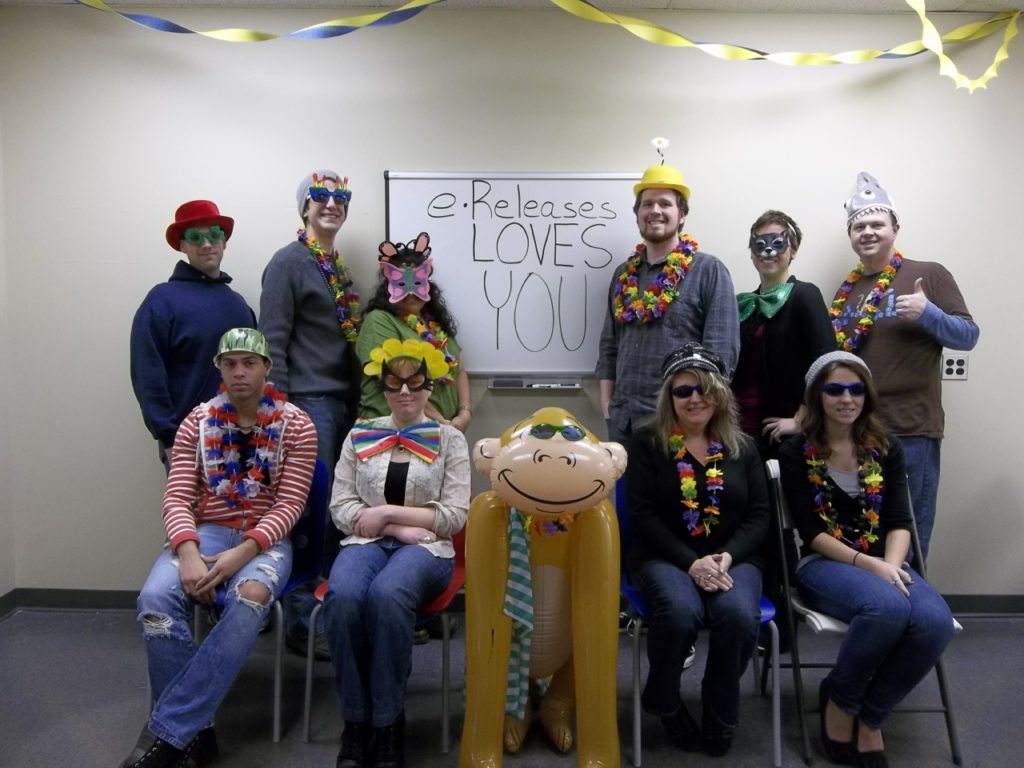Raj Girn: With this week’s media and communications-themed show, where we’re deep-diving the question: Do I really need media exposure to get clients? To help me with this discussion I’ve invited the founder of eReleases, Mickie Kennedy to join me.
Here is Part One of our conversation:

Raj Girn: Mickie, what an absolute pleasure. I’m super excited about having this conversation with you. Thank you so much for agreeing to be on.
Mickie Kennedy: Oh, thanks for having me.
Brilliant. So let’s just dive right in. What I want to do first, Mickey, is I want to begin by giving people context on why I feel that you’re the perfect person to have this particular discussion with. So can you share what you thought to be the gap in the marketplace that led you to start it eReleases? Let’s go there first.
Sure. So when I started eReleases about 23 years ago, there was no one offering press release distribution for small businesses at their price points. And over the years, PR Newswire reached out to us and said, “Hey, you should also include our distribution.” And I pointed out that they charge over $1,000 to move a press release nationally and my clients are paying, at that time, around $250.
And so they looked at my client base. They acknowledged that their salespeople would never be interested in reaching out to people whose budgets were so small and the volume of releases that they do were so small. So they felt like this was an opportunity to serve the small business community. So we worked out the pricing so that everyone that releases a press release, through eReleases gets a national distribution over PR Newswire, as well as the additional services that we’ve always provided, like email sense and things like that.

That’s brilliant. So essentially speaking, for those people who aren’t so familiar with the whole process of press releases, which I want to kind of get into next, can you just explain what eReleases actually is? Explain that to them for those people who aren’t really familiar with the world.
So eReleases is a press release platform. We have editors that can communicate with you by phone or chat or email, and basically help to get you to send us a press release or have us write a press release for you and then take that release and announce it to the media. We announce it to the media through email, which we’d always done. That was that you release as part of our name. But we also, like I said, include that newswire distribution on PR Newswire, which is the oldest and largest newswire of press releases.
A lot of people have heard of newswires out there like AP, UPI, Reuters, Dow Jones, stuff like that. They are not newswires of press releases their news wires that actually license the content that they write. Everything’s written by them and they license it to newspapers and other broadcasters and things like that. So in the U.S. press release, news wires consist of PR Newswire, Business Wire and Globe Newswire. So there’s been a lot of consolidation over the years. I think we’ve gone from five or six to just three.
That’s brilliant. So can I ask you this, Mickie? How does what you do differ in terms of your press release services to the ones that you just mentioned? I feel you’ve answered this question, but I just want to make sure that we get it clear for everyone out there?
So basically, we’re able to consult with the client and give them free information and coach them to get that release done. The other wires are basically you just upload a release and you hit send and you pay $1,000 to move a release through them. With us you get that. But you also get that editorial support. You get the follow-up. There are some extras that we include that you wouldn’t get if you went directly to the newswire as well.
“Basically, we’re able to consult with the client and give them free information and coach them to get that release done. The other wires are basically, you just upload a release and you hit send and you pay $1,000 to move a release through them.” ~Mickie Kennedy
That’s brilliant. So can you walk us through the process a client would go through when signing up for a press release service on your particular platform? What should they expect?
If they have a press release ready and they want to send it out, they can just click on the order button and walk through it. They’ll choose perhaps the industry targets that they want to reach, because when you go over the wire, it’s generally tagged for specific industry categories and things like that. You’ll get the opportunity to include local saturation as well. That’s basically your release is going out nationally, but let’s say it’s really applicable to local Chicago, so you would want to tag it for that. So that’s something that you could choose as well.
You would upload the release. If you have images, you could upload those. You’re given the option to pay additional for embedding the images, but you don’t need to do that. If you upload the images, they will still be there on the newswire, as well as turned into links for people who receive it by email and things like that. So there’s no need to embed it just necessarily to make it look prettier. But that is a service that the newswire charges extra for. And I do say small businesses definitely don’t want to spend the additional dollars for that. You would select when you want it to go out. The default is the next business day, but you could choose any day in the future that you want it to get out and then you hit send. It goes to an editor. They’re going to review it. They’re going to call you.
If they have some questions or they see something that’s just glaring or it could be strengthened, they may make a suggestion to you. And then we set it up for the wire and they hit send and you start getting emails, you get an email report. After the release goes out, you get one-two days later, I think, and then there’s a five day and a 30 day and it is a living report. So if you go back to it and click on the link, you’ll see live numbers at any particular time. And I think it falls off after 60 or 90 days of tracking and stuff like that. It is important also to keep an eye of mentions of your company following the announcement. Google Alerts is okay, but I really recommend that you go into Google News and do a search for your company name or something that’s pretty specific that was in the press release.

If you are announcing a product or something like that and you can actually select an advanced search, the date range, you could choose the date range of when you release the press release to now. And I also recommend that you go to Google Web and you do the same thing through a traditional web search. Also picking the dates. There are news outlets that have asked to be excluded from Google News, but they still get monitored in Google Web. So by doing both of those things, you’re going to track a lot more mentions of your company. That may happen, and you don’t need to pay a lot of money to a clipping service. Clipping services are expensive. That can easily be $1,500 a month, and you can do this yourself by using the tricks that I said. It’s probably going to catch 95 per cent of what gets picked up out there.
That’s a lot of information and a lot of goodies for people to be able to access. And what I love about a lot of what you’re saying here is that Ereleases is truly accessible. And that’s the big point that I want to really get out there for everyone. Anyone out there that’s interested in finding out more, what is the contact information that we can share with everyone?
Just visit eReleases.com. We have chat available there during business hours, 7:00 a.m. to 7:00 p.m. Eastern Time. We have a phone number. We’re very responsive during office hours. There’s an email form that you can fill out there as well. And our social media, LinkedIn is the best way to reach me personally. But feel free to reach out with our staff. We only employ editors, no salespeople. So there are no commissions, there’s no quotas or anything like that.
We’re usually very upfront if we feel that PR is going to work for you. There are particular industries for which PR doesn’t work because it might be particularly regulated. Some of the alternative health stuff like that, it’s really difficult for it to get the distribution over the newswire. So it may not be a good fit for you, but if you just ask and communicate what you’re announcing. If you even want to send a release over for us to review it, we’re willing to do that even before you place an order.
That’s brilliant. I love everything about what you just shared there. For anyone, Mickie, who doesn’t quite understand the importance of press releases to create awareness for their business and or their brand, can you share some advantages for utilizing this kind of service to get to people?
So the thing that I say about PR is if you’re going to consider it, commit to a proper PR campaign that’s usually six to eight releases. And you want them to be different hooks, different angles that you’re approaching. You want to be strategic with what you’re announcing. We get at eReleases probably 20 per cent of our releases are personnel changes. They’re not important. Most of the time at your local newspaper and maybe one trade publication that mentions that a particular person has moved to director of the position or something like that within the company.
If you’re going to spend money, especially if you’re a small business, you want to release stuff that potentially could get media coverage and get lots of articles. We’re not looking for the press release to be put on a bunch of different websites. We’re looking for people to actually write an article about you. And it does happen. A lot of my clients that do surveys or polls, and they work very well, often get between 6 and 14 articles written about them because of the results of their survey that they issued and they did a press release on. That’s a way to be very strategic, even if you don’t feel that you’re newsworthy.
“If you’re going to spend money, especially if you’re a small business, you want to release stuff that potentially could get media coverage and get lots of articles. We’re not looking for the press release to be put on a bunch of different websites. We’re looking for people to actually write an article about you.” ~Mickie Kennedy
And right now is a really great time to take the pulse of your industry and see how they feel. You know, coming out of the pandemic going into winter are people keeping their marketing spends the same. Are they increasing? What does their labour situation look like? That stuff right now that if you were to get a survey of your industry and release it, the media would be very receptive to the results. You want to share them with their audience at the end of the day. Today journalists act as gatekeepers. And if they feel this information is really relevant to their audience, they’ll want to share it with them.
And I always get asked what if I don’t have a lot of leads or people to send a survey to? Partner with a small trade association. Big trade associations are hard to work with, but the smaller ones don’t get a lot of love out there, and they don’t get mentioned a lot. So if you approach them and say, “If you could send this survey to your members and exchange, I’ll include you in a mention in my survey.” And sometimes you can even co-brand the survey between you and them, and that might help you, especially if you’re not very well known in your industry. So those are ways of being very strategic and getting out there, sticking to the idea of doing strategic releases, doing six to eight of them.
You can do this yourself. You don’t need to necessarily pay us to even write the release. They’re not rocket science. They’re written in the third person. They’re very simple and easy to understand. The place I say to spend a little extra time is the headline because that is the way that journalists view things streaming by headlines and also spend a little bit of extra time with your quote. So many times people just put a safe quote in a press release. And I’ve seen journalists just work on a story and then just say it didn’t have any pizzazz. But if there was an amazing quote that was in that press release, even their managing editor would say, “Oh, I understand why they wrote this article.” That’s a great quote and they built a story around it. So that’s another way to ensure that you do get a media pick-up on maybe something that doesn’t stand out as newsworthy.

And from my perspective, if I had a client that came to me that wanted this kind of service, Mickey, I would recommend that they actually have the release written by people that know what they’re doing. These are some of the things that do get lost in the mix and with the amount of press releases that are going out there on any given subject matter, it’s really good to be able to garner the experience of people like yourselves to be able to really tap in and hone in on your message.
Because oftentimes what I found, and I’m sure that you can also attest to this, is the person is so close and passionate to their specific product service mission mandate that they feel that people will just align with it because they do. People aren’t vested oftentimes in what you do or what you believe in because they haven’t been along the journey with you. They don’t understand why it is so important to you and how it could potentially be valuable to their lives. This is why I feel press releases really are an art and that they do need to really be done right by the right people. What are your thoughts on that?
I agree, but at times it comes across as disingenuous because I offer writing services. So I do try to provide auto coaching and white papers and stuff like that so that people can write and build the best press release that they can build. That being said, the worst press releases that I get are from writers, authors, mostly fiction writers, and it’s because they’re so invested in the world that they’ve created. They haven’t yet removed themselves enough to be able to describe that world to someone who doesn’t know it. And they take so much for granted and they really don’t understand the framework of the book by which they need to describe that in a press release.
And so I do agree with you that sometimes being so close to the subject matter makes it very difficult or it creates a handicap where it might make it harder to do so. At the very least, I would recommend for your first press release, consider using us or someone else to write the release. And then after you look at it and you say this is very simplistic, you can take a strategic framework and write a release yourself and give it a shot and see how it works.
“I would recommend for your first press release, consider using us or someone else to write the release. And then after you look at it and you say this is very simplistic, you can take a strategic framework and write a release yourself and give it a shot and see how it works.” ~Mickie Kennedy
Absolutely. When are good times to invest in press release services and how can people maximize on that?
The best time to invest in press releases is when you have a little bit of time. And so if you’re really busy and stressed right now, it may not be a good time. But some of the people who do the best with press releases are during recessions and downturns in the market. They’re no longer spending the dollars on marketing that they traditionally do. So they have all this freed-up time in which they can start thinking strategically of what could I announce to the media? And then they’ll do a PR campaign and they get really good results. So it doesn’t necessarily mean that it works very well during a recession.
But what I find is that there’s a large number of people who just have the available hours to devote to PR and press releases. That being said, I think that any time is a good time to get involved with PR. It doesn’t have to be very time-consuming, especially if you’re utilizing a service to write it for you and then get it out there when it comes to the media contact. You know, generally, the media will contact you if they’re writing a story or if they really want to explore it a little bit more, and they’re very serious. So most people don’t get dozens of contacts and you’re not overwhelmed. It’s generally very small, and most of it’s through email because a lot of these journalists are shy English majors like myself a little bit.
And so they prefer email as the medium because there’s also a paper trail and that’s a good way to communicate. So I say anytime that you can devote a little bit of time to it, consider it. But that being said, I do see a huge uptick in our business during every recession we’ve gone through. That includes the dot com crash, the housing bubble and even during the pandemic. A lot of people just didn’t have their traditional marketing available. So they were open to exploring PR, and they did very well with it. And what we see is those clients tend to stick around a long time once they’ve seen how it works and continue to feed the media and get those results.

Absolutely. So I have to ask you this, Mickey, are there any contraindications for doing a press release? Like is there a time when no, you should not do this?
Well, I say you really shouldn’t do it if you’re overwhelmed. For example, I’ve had people who have been really hot. They had a Kickstarter blow-up, and they had so many orders that they’re just like, they don’t have the logistics to fill it and they feel like it would be nice to get some media attention because we’re killing it. And so sometimes when you’re already overextended, you may not want the additional coverage and the additional orders that may be. There’s also the instance where if you’re trying to promote or what they call you’re riding the coattails of something that’s already out there that’s trending in your industry. The subject matter might skew so negative that you don’t want to be aligned with it.
And so you have to be comfortable if you’re going to talk about a subject, especially if it’s controversial that you’re not going to alienate your existing customer base and that you’re going to come across as someone that people at the end of the day want to do business with. Because, if you are a contrarian and you embrace a controversial subject matter, you will get media picked up, but you may not like the results. You may lose customers and you may find it difficult to get customers as a result of it.
“If you are a contrarian and you embrace a controversial subject matter, you will get media picked up, but you may not like the results. You may lose customers and you may find it difficult to get customers as a result of it.” ~Mickie Kennedy
Absolutely. A lot to think about guys. If you’re just joining us, I’m in conversation with Mickie Kennedy, who is the founder of eReleases. And we’re talking about why eReleases are a good option from a media perspective and why media is even something you should be considering if you are looking at getting clients.
So I want to shift our focus to the theme of today’s show a little bit now, Mickey, which is do I really need media exposure to get clients? A lot of entrepreneurs still don’t value media campaigning to acquire clients because media is synonymous with celebrities, politicians and big corporations. It’s almost like this historical untouchable world. I want your thoughts on this to maybe help everyday businesses and everyday people and thought leaders understand that this truly is an accessible and viable opportunity.
Great. I mean, at the end of the day, journalists are looking for stories every day, and they do not like reporting on the large companies that can easily advertise. They like to be seen as someone who is curating news and content and bringing to light or putting a spotlight on a unknown company or something that’s new and novel. And so that’s a great opportunity if that applies to you. Small businesses do very well with media coverage. Much better than, say, Microsoft. Microsoft does get mentions all the time, but not as many as you think. And that’s because people know that Microsoft can control advertising, and they should be spending their money on ads, not getting free media coverage as a result.

So if you can sort of developing a story or an angle about something that would be really relevant in your industry or to a particular audience, I think that a press release can really get you some major media pickup. And what my customers find is that if they get four to six articles written about them, the traffic that they get, sometimes it’s not a lot. But most of it converts. And what happens is there’s this credibility. It’s almost like an implied endorsement when, say, the New York Times writes an article about you. And so even if they don’t link to you but mention your company, someone’s going to open a window.
If they’re going to do a search and they’re going to find you and they’re going to click order. They’re not going to say now can I price shop and get cheaper on Amazon or someplace. They’ve got this warm experience that they’ve read about. They want to do business with you. And that’s what the real power of PR can do for you. You could then take that article and share it with your leads, and then maybe they’ll get the same experience and want to convert as a result with you. Share it with your customers. I say whenever you get media coverage, that’s a time to celebrate and to share it with as many people as possible. Share it with your social media. And you know, as a result, you generally will get better customers coming to you from that media coverage.
“Whenever you get media coverage, that’s a time to celebrate and to share it with as many people as possible. Share it with your social media. And you know, as a result, you generally will get better customers coming to you from that media coverage.” ~Mickie Kennedy
The thing that advertisers and marketers hate is it’s not necessarily repeatable. And so what happened with one press release may not happen with the next. It is trial and error, and it is hit and miss. But with a proper PR campaign of doing strategic releases and you understand that you want to serve the journalist and not yourself. So if you come at it from, I’ve got something that is really cool and I could see journalists willing to share it rather than saying it would be really great if you did this article about my product. And so if you come at it from that, you can really benefit.
Absolutely. And that’s the whole thing here is creating that human connection between your value proposition so that it makes sense to an audience that you’re trying to reach.
To contact Mickie Kennedy: Web, LinkedIn, Twitter, Facebook, Instagram












